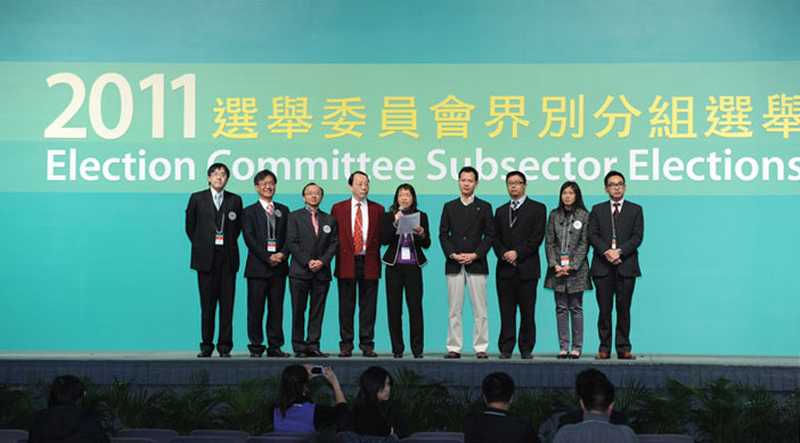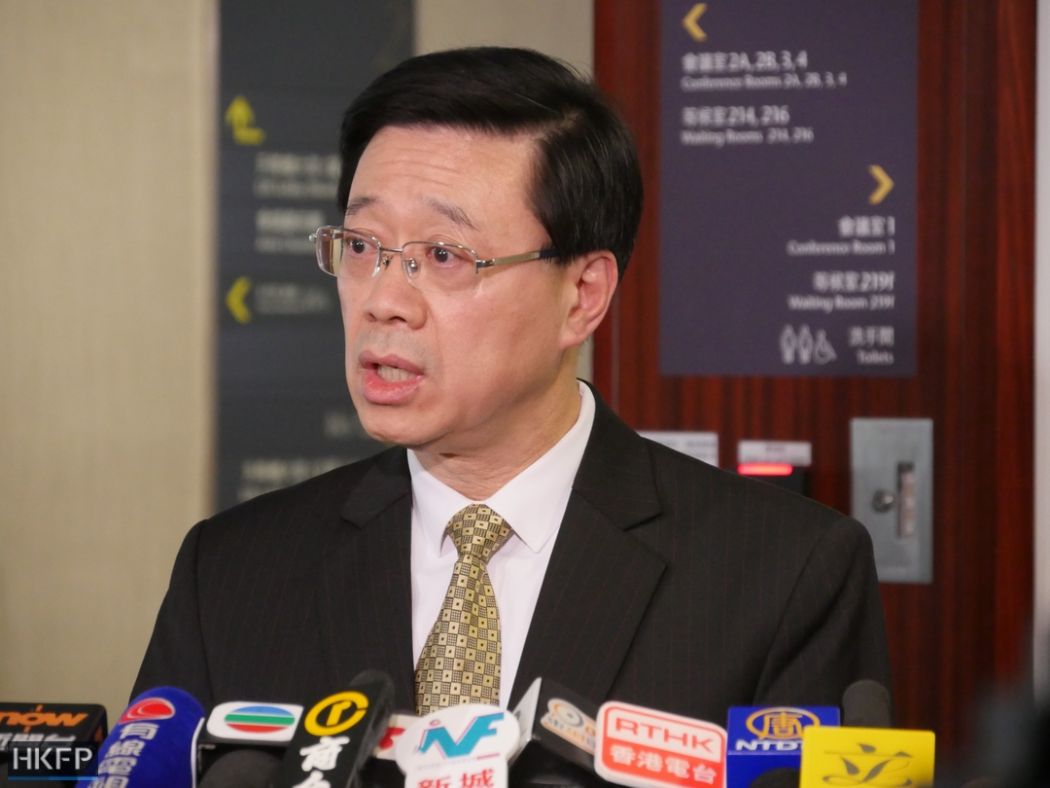More prominent figures from Hong Kong’s legal sector have spoken out against the government’s plan to amend its extradition laws, despite the bill already arriving at the legislature last Wednesday.
The legal subsector of the Election Committee issued a joint statement on Monday urging that the bill be withdrawn. The 1,200-member Election Committee are the only people in Hong Kong with the power to elect the chief executive. The legal subsector is allocated 30 seats.
All 30 members co-signed the statement expressing “deep concern” over the bill. It was the fourth-ever collective statement issued by the group.

“We urge the Security Bureau to withdraw the bill which, if passed, would severely undermine the international community’s confidence in Hong Kong’s criminal justice system and its commitment to protecting human rights,” the statement read.
The government proposed amending the city’s laws so that extradition could be conducted using a case-by-case system, without the need for pre-existing bilateral agreements with other jurisdictions.
Whilst the administration says the plan is intended to close a legal loophole, critics are most concerned with the plan to roll out a rendition agreement with mainland China.
”In Full: Legal Subsector of the Election Committee statement – Click to view“
1. We make this Joint Statement to express our deep concern over the proposals contained in the Fugitive Offenders and Mutual Legal Assistance in Criminal Matters Legislation (Amendment) Bill 2019 (“the Bill”) to amend the Fugitive Offenders Ordinance, Cap. 503 (“FOO”) and the Mutual Legal Assistance in Criminal Matters Ordinance, Cap. 525 (“MLAO”).
2. We sincerely call upon the Government as well as the community to seriously consider the following points:
(1) The exclusion of the Mainland from any surrender arrangements with Hong Kong was a deliberate choice made by the legislature when enacting the FOO more than two decades ago rather than “loopholes”;
(2) Such exclusion of the Mainland from the application of the FOO was a result of the grave concerns over the protection of human rights and the rule of law as well as certain unsatisfactory aspects of the criminal justice system in the Mainland. In proposing to now include the Mainland in the application of the FOO by way of “special surrender arrangements” in the Bill, the Government has failed to explain what circumstances have changed since 1997 to justify the departure from the deliberate choice of exclusion;
(3) The proposed “special surrender arrangements” will be initiated by the Chief Executive alone by way of issuing a certificate. The substantive provisions of each special arrangement will be formulated by the Chief Executive alone and will not be subject to any legislative scrutiny which is an important safeguard under the current mechanism of case-based surrender arrangements;
(4) The statutory procedures for the proposed “special surrender arrangements” under the Bill do not offer adequate safeguards given the very low threshold for making an order of committal (namely, a prima facie case) and the limited role of the Court in reviewing and rejecting a request for surrender;
(5) It is misleading to suggest that the rights of individuals concerned are protected as they still have access to procedural safeguards including applications for habeas corpus, bail, discharge in case of delay or judicial review, in that these are all irrelevant to the crucial question of whether those individuals’ fundamental rights could be protected in the requesting jurisdiction after surrender;
(6) Compared to the “special surrender arrangements” proposed in the Bill, the Government clearly has better alternatives in tackling the Taiwan homicide case, such as (i) amending the FOO and the MLAO to provide for case-based rendition arrangements to Taiwan only and entering into a memorandum of understanding with Taiwan for a one-off rendition of the suspect in question, or (ii) amending the Criminal Jurisdiction Ordinance, Cap. 461 and/or the Offences against the Person Ordinance, Cap. 212 so as to extend the jurisdiction of Hong Kong courts over homicide cases committed at places outside Hong Kong in which both the suspect and victim are Hong Kong permanent residents; and
(7) The proposed exemption of nine offences from the “special surrender arrangements” under the Bill not only fails to address the concerns that the public has expressed about surrendering individuals to the Mainland, but also demonstrates that those concerns are indeed justified.
3. On top of the points highlighted above, it is noteworthy that on 12 March 2019, the Legislative Yuan of Taiwan unanimously passed a motion requesting the Executive Yuan of Taiwan to negotiate only a bilateral arrangement for surrender of fugitives between Hong Kong and Taiwan. In particular, the motion expressed concerns over the risk imposed on Taiwan people in Hong Kong to being surrendered to the Mainland if the Bill were passed. This means that it is feasible to tackle the Taiwan homicide case by concluding long-term or case-based arrangements with Taiwan without extending the same to the Mainland.
4. We urge the Security Bureau to withdraw the Bill which, if passed, would severely undermine the international community’s confidence in Hong Kong’s criminal justice system and its commitment to protecting human rights.
April 8, 2019
Chan King Sang Edward SC
Dykes Philip John SC
Leong Kah Kit Alan SC
Harris Graham Anthony SC
Pang Yiu Hung Robert SC
Pun Hei Hectar SC
Char Shik Ngor Stephen
Cheng Shui Tai
Cheung Tat Ming Eric
Cheung Wai Yee Betty
Cheung Yiu Leung
Clancey John Joseph
Ho Chun Ki Frederick
Ho Chun Yan Albert
Kwok King Hin Douglas
Lam Kenneth
Liu Sing Lee Bruce
Man Ho Ching Jonathan
Ng Sze Nok Senia
Poon Suk Ying Debora
Shek Randy Shu Ming
Tam Chun Kit Jeffrey
Vidler Michael John
Wong Hok Ming Alan
Wong Huk Kam
Wong Kwok Tung Daniel
Wong Shui Hung Linda
Wong Yu Yat Anson
Yip Hoi Long Richard
Yuen Chan Suk Yee Helena
The proposal has been criticised twice by the Hong Kong Bar Association – once in its initial form, and after the government amended the bill to make concessions to the business sector.
In its Monday statement, the electors echoed much of the Bar Association’s sentiments. “The exclusion of the mainland from any surrender arrangements with Hong Kong was a deliberate choice made by the legislature when enacting the Fugitive Offenders Ordinance more than two decades ago rather than ‘loopholes,’” they said.
The electors said the government failed to explain why the mainland’s judicial system was now considered acceptable.

The proposed bill will also hinge on the chief executive to make key decisions, while local courts may only play a limited role, they added.
“It is misleading to suggest that the rights of individuals concerned are protected as they still have access to procedural safeguards.”
The government’s bill has faced strong backlash even after attempts to water down its content. Last month, Secretary for Security John Lee announced that nine categories of commercial crime would be excluded from the bill.
However, the American Chamber of Commerce, as well as UK and US representatives, have expressed continuing concern on the subject.
Kong Tsung-gan‘s new collection of essays – narrative, journalistic, documentary, analytical, polemical, and philosophical – trace the fast-paced, often bewildering developments in Hong Kong since the 2014 Umbrella Movement. As Long As There Is Resistance, There Is Hope is available exclusively through HKFP with a min. HK$200 donation. Thanks to the kindness of the author, 100 per cent of your payment will go to HKFP’s critical 2019 #PressForFreedom Funding Drive.

